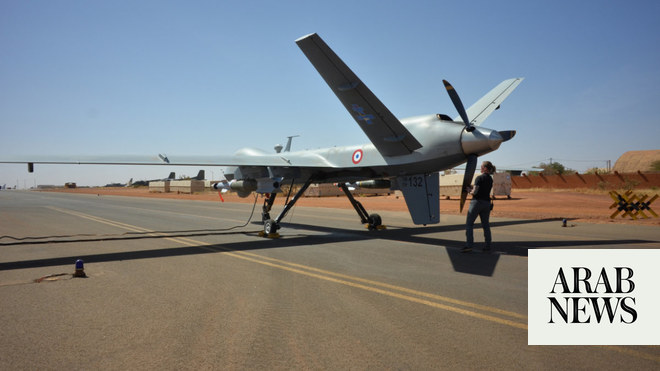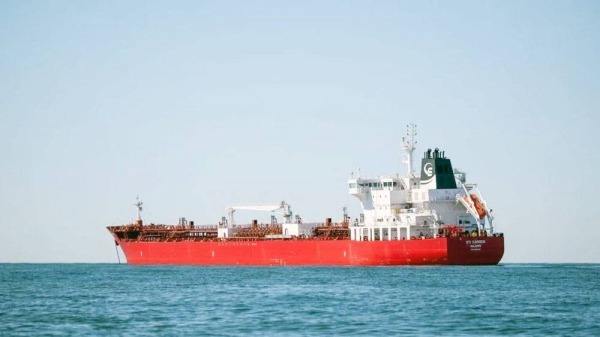
The US Federal Aviation Administration warned of danger to flights
Under pressure to respond to the high-stakes incident in the strategic Strait of Hormuz, US President Donald Trump initially struck a combative tone
WASHINGTON: Washington on Thursday barred American civilian flights from the area where Iran shot down a US military drone, a strike that President Donald Trump slammed as a “big mistake.”
The downing of the drone – which Washington insists was above international waters but Iran says was within its territory – has seen tensions between the two countries spike further after a series of attacks on tanker ships the US blamed on Tehran.
Under pressure to respond to the high-stakes incident in the strategic Strait of Hormuz, Trump initially struck a combative tone.
“Iran made a very big mistake!” he tweeted in response to news Iran had shot down the Global Hawk surveillance aircraft.
“This country will not stand for it, that I can tell you,” he said later at the White House.
But as the overnight incident whipped up fears of open conflict between the United States and its declared foe Iran – sending crude oil prices soaring – Trump moved swiftly to dial back tensions.
“I find it hard to believe it was intentional, if you want to know the truth,” Trump said. “I think that it could have been somebody who was loose and stupid that did it.”
The president’s mixed message left the world unsure what Washington’s next move would be.
“You will find out,” Trump said, when asked about possible retaliation – a statement followed later in the day by a New York Times report that the president had approved but then canceled strikes on Iranian targets such as radar and missile batteries.
Foreign Minister Mohammad Javad Zarif announced Thursday that parts of the drone had been recovered in Iranian territorial waters, as Tehran moved to bring the incident before the United Nations.
“We don’t seek war, but will zealously defend our skies, land & waters,” Zarif said.
The US Federal Aviation Administration warned of danger to flights “demonstrated by the Iranian surface-to-air missile shoot-down of a US unmanned aircraft system,” and barred American civilian aircraft from the area where it took place “until further notice.”
The Pentagon denounced the “unprovoked attack,” claiming the navy drone was 34 kilometers from Iran when destroyed by a surface-to-air missile.
But the Islamic Revolutionary Guard Corps said it brought the drone down as it was “violating Iranian air space” over the waters of Hormozgan province.
Zarif provided coordinates to back the claim.
“At 00:14 US drone took off from UAE in stealth mode & violated Iranian airspace,” Zarif tweeted. “It was targeted at 04:05 at the coordinates (25°59’43”N 57°02’25”E) near Kouh-e Mobarak.”
“We’ve retrieved sections of the US military drone in OUR territorial waters where it was shot down.”
But the Pentagon published a map showing the flight path of the drone, which indicated it traveled outside of Iranian waters and included a photograph showing it was at the coordinates (25°57’42”N 56°50’22”E) when it was downed.
In a letter to the UN Security Council and UN Secretary-General Antonio Guterres, Iran protested against a “dangerous and provocative act by the US military forces against the territorial integrity of the Islamic Republic of Iran.”
The drone downing came as Iran was already accused by Washington of carrying out attacks on tanker ships in the congested Hormuz area.
Tehran denies involvement but has frequently threatened to block the sea lanes used to ship much of the world’s oil exports.
The commander of the US Naval Forces Central Command, Sean Kido, said a mine allegedly used in one of the attacks matched Iranian weaponry and that incriminating fingerprints had also been collected.
Trump has repeatedly said he does not favor war with Iran unless it is to stop the country getting a nuclear weapon – something Iranian leaders insist they are not pursuing.
But Trump critics say his policy of “maximum pressure” – including crippling economic sanctions, abandonment of an international deal to regulate Iran’s nuclear activities, and deployment of extra troops to the region – make war ever more likely.












